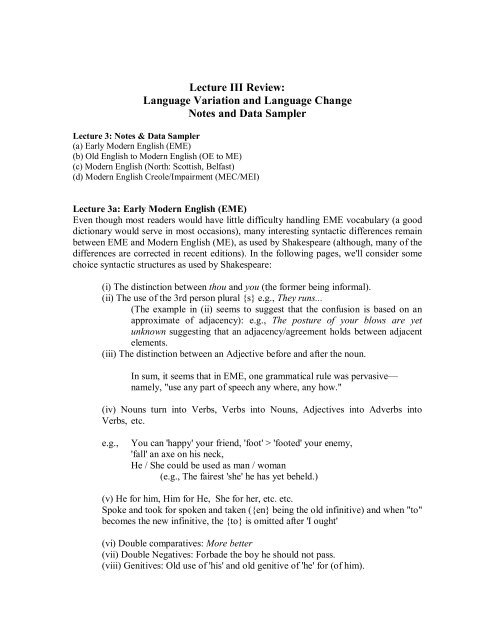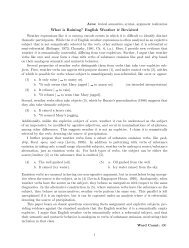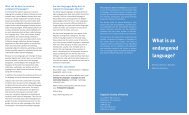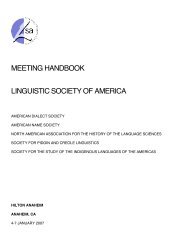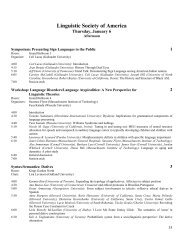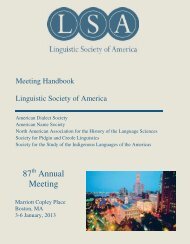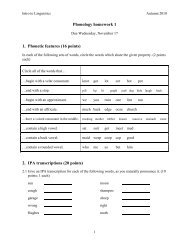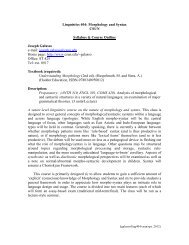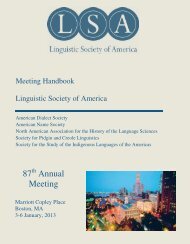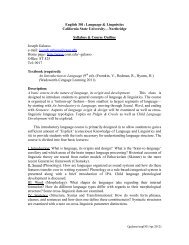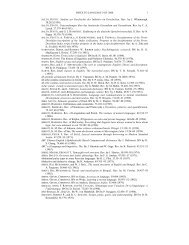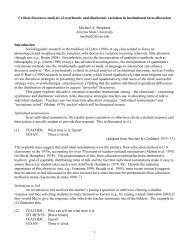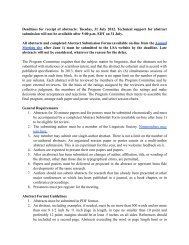Lecture III Review: Language Variation and Language Change ...
Lecture III Review: Language Variation and Language Change ...
Lecture III Review: Language Variation and Language Change ...
You also want an ePaper? Increase the reach of your titles
YUMPU automatically turns print PDFs into web optimized ePapers that Google loves.
<strong>Lecture</strong> <strong>III</strong> <strong>Review</strong>:<strong>Language</strong> <strong>Variation</strong> <strong>and</strong> <strong>Language</strong> <strong>Change</strong>Notes <strong>and</strong> Data Sampler<strong>Lecture</strong> 3: Notes & Data Sampler(a) Early Modern English (EME)(b) Old English to Modern English (OE to ME)(c) Modern English (North: Scottish, Belfast)(d) Modern English Creole/Impairment (MEC/MEI)<strong>Lecture</strong> 3a: Early Modern English (EME)Even though most readers would have little difficulty h<strong>and</strong>ling EME vocabulary (a gooddictionary would serve in most occasions), many interesting syntactic differences remainbetween EME <strong>and</strong> Modern English (ME), as used by Shakespeare (although, many of thedifferences are corrected in recent editions). In the following pages, we'll consider somechoice syntactic structures as used by Shakespeare:(i) The distinction between thou <strong>and</strong> you (the former being informal).(ii) The use of the 3rd person plural {s} e.g., They runs...(The example in (ii) seems to suggest that the confusion is based on anapproximate of adjacency): e.g., The posture of your blows are yetunknown suggesting that an adjacency/agreement holds between adjacentelements.(iii) The distinction between an Adjective before <strong>and</strong> after the noun.In sum, it seems that in EME, one grammatical rule was pervasive—namely, "use any part of speech any where, any how."(iv) Nouns turn into Verbs, Verbs into Nouns, Adjectives into Adverbs intoVerbs, etc.e.g.,You can 'happy' your friend, 'foot' > 'footed' your enemy,'fall' an axe on his neck,He / She could be used as man / woman(e.g., The fairest 'she' he has yet beheld.)(v) He for him, Him for He, She for her, etc. etc.Spoke <strong>and</strong> took for spoken <strong>and</strong> taken ({en} being the old infinitive) <strong>and</strong> when "to"becomes the new infinitive, the {to} is omitted after 'I ought'(vi) Double comparatives: More better(vii) Double Negatives: Forbade the boy he should not pass.(viii) Genitives: Old use of 'his' <strong>and</strong> old genitive of 'he' for (of him).
Two EME Parameters:+Prodrop:Omission of subjects in declaratives <strong>and</strong> in questions:Omission of (2pers) Thou (with {st} verbal affix)'Didst not mark that'. (Othello)(Did not you mark that?)'Hast any more of this?' (Temp)(Have you any more of this?)'Canst not rule her?'(Can't he rule her)(Winter's Tale)+INFL:Plural adjectives (like Spanish e.g., carros rojos /red cars):a. 'The thicks lips' (Othello)b. 'Smooth <strong>and</strong> welcomes news'The development of verbal s throughout the history of the English language shows avariable usage, whereby Inflection <strong>and</strong> Agreement were not evenly present. Incontemporary St<strong>and</strong>ard English, the subject <strong>and</strong> verb agreement presents in the thirdperson singular present indicative. This inflection marker seems to be a fact of EarlyModern English development; prior to this period, AGReement <strong>and</strong> INFLection were notcategorically realized, nor was the marker (s) restricted to third person singular.Verb Inflections: There were three forms of the third person verbal plural in EME:Northern {es}, Midl<strong>and</strong> {en}, Southern (eth}: They hopes, They hopen, They hopeth.Shakespeare used all three {th} e.g., They doth, hath,{en} ‘Where, when men been, there's seldom ease’.Third Person Plural in {s} e.g ‘His tears runs down’.Our Third person Singular {s} today perhaps derived by analogy of double nounsubjects:e.g., ‘Faith <strong>and</strong> trust bids them’eventual change to quasisubjects It/There/Here...Quasi Subjects:‘Here comes the townsmen’ => SVOThough the true subject townsmen gets plural AGR sincecomes agrees with Object [+Pl]<strong>Change</strong> occurs when a Sing subject replaces via analogy a quasi subject:Here/It/The boy comes...2
e.g., Faith & trust => It bids them...etc. with It loosing number. (?)In other words, double nouns extended to single noun subjects:Hence, Third Person/Sing {s}Second Person singular {s}{s} may apply on both 2nd <strong>and</strong> 3rd person inflection.'Thou (you) fleets, thou torments' 'thou runs' etc....{est} {th} Thou seest (you see), thou sayst (you say)'Thou thinkest not of this'{th} Sometimes extended to third person: 'no man like he doth grieve'Third person singular {s}{s} 'He closes with you(Also possible extension form plural {s} as noted).{th}She taketh...(She takes)Questions:Aux inversion in Shakespeare:Often Aux insert is omitted:Though, we do find: 'Is all things well?''Didst thou not hear somebody?''Will you not dance?''Do you fear it?'In EME, both the Main Verb or Auxiliary can undergo inversion.Main Verbs Invert:'Revolt our subjects?' (Richard II)'Forbid him not?' (no Aux insertion w/negation)'Saw you my master?' (Two Gents from Verona)'Speak not you for him!''How came you hither?''You are come to see my daughter?''Came you from the church?''Wrong I mine enemies?' (note 'mine' as prenominal)Negation:Aux Do omitted before 'not' (SnegV(O))e.g., 'I no doubt' (Temp)'It not belongs to you' (Hen. iv)Do/Did were used for emphasis only.e.g., 'The ghost did shriek'3
Negation used with other Main Verbs (SVneg(O)):e.g, 'He heard not that'. (Two Gents from Verona)'I care not for her'.'He loves not you'.'My master seeks not me'.'Fear not you that!''Come not thou near me'.Neg final:'I fear thee not'.'The men likes me not''Wrong me not!'Auxiliary inflections:Be:Aux [Finite] used for notions of doubt, question, thought...e.g., 'Be my horses ready?' (Lear)'Where be thy brothers?' (Richard)'I think it be'I think my wife be honest'Modals:Must: 'Must' (found in Early English (EE) as [Mot] meaning 'to be able'inflects: e.g. 'moste' where the bare verb stem is 'mot'.Will: 'He wills to come' ('will' gets inflection)'Thee will I love'Can: 'They can well on horseback' (Hamlet)'Can' used as main verb.Might: 'Would I might but even see that man'(Temp)'Might' used as main verb.Should inflects as past tense of Shallas do all modals: can > could, shall > should, may > might. etc.Nominal Inflections: Possessive {'s]His was used as a mistake for {'s} whereby {s} marked Genitive Case.e.g., "Mars his sword, Neptune's trident, nor Appollo's bow..."Mars's marked due to phonology => his.'The count his gallies' (= The count's gallies)4
Possessive my / mine were used interchangeably. e.g., 'Mine honour'His becomes possessive inflection of He <strong>and</strong> their of them.e.g., 'His wrongs' (otherwise spoken wrongs done to him when objectives)Subject possessive => HisObject possessive => of(Though they would both later overlap).More EME Anomalies• Adjectives freely used like Adverbsa. Thou didst it excellentb. 'Tis noble spokenc. Did I expose myself pure for his love• Articles 'A/The' omitteda. Wherear with ø bladeb. With ø thrilling pointc. In ø glorious Christian fieldd. As ø falcon to the luree. More tuneable than ø lark...f. Creeping like ø snail.* In ø absence (st<strong>and</strong>ard ME) & "until ø death do us part"• Number/Det [Agr]a. This three mileb. But one seven yearsc.This many summersd. A many of our bodies• Pronouns: Case <strong>and</strong> Agr were often confusedHe for Him:a. Which of heb. No man like heHim for He:c. Him (he whom) I accused.When him serves...5
I for Me:f. Here's none but thee <strong>and</strong> Ig. Between you <strong>and</strong> I...h. You know my father hath no child but I.Me for I:*i. I she as tall as me? *('than' <strong>and</strong> 'as' were used as PPs)Mine [+gen] /prenomj. Mine honourk. Mine hostWho for whoml. Who I myself struck downm. Who does the wolf love? With who?• 'Do' becomes an AuxDo as main lightVerb was used in the sense of "to cause/ to make".a. They have done her underst<strong>and</strong>b. Do me some charityc. He did the third his blessing.• 'Do' used with main verbs = [to cause + main infinitive verb]Gradually the force of the infinitive: e.g., do stripen => do stip (=cause to strip)<strong>and</strong> 'do' lost its causative nature <strong>and</strong> became an Aux.=> Do is reduplicated:a. He did do slen hem his nativitee (Chaucer)b. What does do you wrong?'Did' was used as a past tense marker to separate similar Vstem forms:e.g., Did eat (vs. ate)c. The horses did neighd. The ghosts did shriek• 'Do' not used with Negative (SnegV)a. I not doubtb. It not belongs to youc. You not see.• Modals with Tense/Subjunctivea. They Oughten {+Pl}b. He wills (to) come'might' was the past tense of 'may', 'could' of 'can', 'should' of 'shall, etc.'can' used as a verb: "What can man's wisdom?" (Lear. iv)6
• Agreementa. What manners is in this?b. Which very manners urges (Lear, v)c. His tears runs..d. Three parts of him is...e. Two of both kinds makes...f. There is no more mastersg. The posture of your blows are => (inflection/agreement adjacency)• Past Part omitteda. You have articulate (=articulated)b. Let the bloat king...c. He was contract to Lady Lucy. (Rich iii)d. Many are infect.• Infinitive "to" omittedEME Speken = to speak. When {en} weakened/dropped, the {to} took its place.'He can speken' (He is able to speak)a. You ought not walkb. Suffer him speak no morec. He thought have slaine herd. If the Senate still comm<strong>and</strong> me serve<strong>Lecture</strong> 3b: Old English (OE)Introduction1. Subject/Object Case: Passivesmethinks (= I think), Lician (like) = It likes me (passive, as in Spanish/Italian) 'me piace'OE PassiveHim was given a book (OE) (showing subject as [Nom]Him waes holpen (=him was helped (vowel change, {en})HimDat] waes gifen an bocNom](=him [+Dative] was given a book [+Nom])stem = gif => v/f were allophones (e.g., wif = wives)Him me hit beræfodeHim man itAcc bereaved(He was deprived of it)Even though Him was the logical subject, it maintained a Dat case.Case eventually turned to Nom for logical (surface) subject.7
OE PassiveIc eom geseald thyssum dracan..(INom was given this dracon)ME passiveHeNom was given a bookAcc2. PPfronting: Passive To him waes gifen a boc => Him was given => He was given ((Onto) us) a child was borneNB. PPfronting might have helped change the Case marking for surface subjects—turning Dat case into Nom.NB. Also notice "dative shift' is possible due to Case marking:e.g., I gave the bookAcc to himDat vs. I gave him the book3. Word OrderBeing a Case marking language, OE signaled grammatical relations by inflection, ratherthan by word order—however, order was by no means free <strong>and</strong> Case was oftenambiguous.OE = SVO (main clause)SOV (subord. clause)...like German: tense verbs moved to functional cat.NB. (Kiparsky: V2 word order for T/Agr (cf. German) didn't always apply in OE).One situation in which VS order (SubVerb inversion) is normally found is when a mainclause begins with a certain adverb—e.g., qa (=then). Here Adverbs trigger VS order:Consider in:ME: !?Never/Neither were we arrested (possible st<strong>and</strong>ard)(=We were never arrested)!? Never were you home!? Neither were you home.OE: Næs na se halga fæder to menn geboren for us(notwas not the holy father to man born )(=The holy father was not born to man)NB.Word order of cliticsOE: 'Næs' is a clytic of "Næs" (not + Be) => [Neg + Aux]ME isn't won't aren't are clitics (Be+ Not) => [Aux + Neg]Verb Inversion: VSOvqa het he hine wædum bereafianThen ordered he himAcc clothesdat bereave(=Then he ordered him to strip) Inversion = "ordered he'8
SOV Order ac he ne mæg me forswelgan(but he not may me devour) =>[S+Neg+Modal+O+V](= But he may not devour me)OSV OrderA litel maiden child ich founde(A little maiden child I found)NegationNB. Order of Modal <strong>and</strong> NegOE 'Not may' vs. ME 'May not' (Recall, clitic reverse ordering as well)Usage of Double negatives till deemed illogical e.g., via logic of math two negativescancel each other out thus making a positive. Though note that French still uses themwith little problem (ne...pas).ac him ne ofhreow na..(but himDat no(t) pitied not )<strong>and</strong> ic thæs næfre ne sceamige(<strong>and</strong> I am never not shame)4. CaseLoss of Case:By OE, the distinction between Nom <strong>and</strong> Acc case forms had been lost in a large class ofNouns (The masclstem) in both +/Pl. Phonological cause. Many other verbs showedvariability in case due to semantics e.g., transitivity. It is possible that a semantic shiftmay have occurred but with the case marking being fixed—so that no 1to1 iconicrepresentation held between case <strong>and</strong> semantics. This shows the nice dichotomy betweenlexical vs. functional grammar. For instance, Genitive <strong>and</strong> Dative agreements—e.g.,certain case marked verbs taken certain cased marked objects were often mixed.NB. Two types of case marking: (i) inherent (or lexical) <strong>and</strong> (ii) structural (syntactic)—cf. lexical vs. functional). He/She = inherent Nom, while 'The boy saw it' ('it' = structuralcase)OE examples of Pronoun case: (hi = them)'hi' example: ac we nu willð mid fægerum <strong>and</strong>gite hi gefrætewian eow( but we now will with fair meaning themAcc adorn youdative )hi ne demað nanum men ac him bið gedemed.( They not judje noPlDat menPlDat but themdat is judged)NB. Case hi (they), double negative (ne & nanum), Aux (bith= Be).9
<strong>Change</strong> of Pronoun CaseSc<strong>and</strong>inavian Settlers (Vikings) influence: 'They' substitute for 'earlier 'hi':first 'they' example 1200note: Prn We, hi (them), modal will, ge past part prefix (= {en} becomes Infinitive EME)He (sg) vs. he (pl) (no number distinction) loss of the Ye/uyou distinctiona. He was buhsum OE ge (ye) = you [2 +Nom](He was obedient)'you' descended from 'eow'b. he sculen... 'you' replaced 'ye' for [+Nom] (15c)(They should...)i. Early distinction of Acc vs. Dativea. hire [+dat] heom [+Acc]ii. Later No distinction between Acc & Dative (like English today)Acc: Him (1200)a. Him me hit bearaefodeHim man itAcc/Dat bereaved(He was deprived of it) passiveOE Case 1P ParadigmIc singe (I sing)we singath (we sing)1P +Pl ac we nu...)(but we now..)ne sæde we hit eow(not said we it you)OE Case 2Pthu singest(you/ye sing) ge simgth (you sing)In OE, ge was used for the [+nom] 2P while eow was used for both Dat <strong>and</strong> Acc.2P & Reflexivegif ge sylfe hwæs biddath he hit...(if youNom self whatGenask he itAcc...)10
OE Case 3P Paradigmhe/heo/hit sineth (He/she/it sings)hie (they)Mascl Fem NeutNom he (Se) , hie heo, hie, *he hit (=it)Acc *hine (him) hie, hes, his hitGen his(e) hire hisDat him hire him*She was marked as Sche (Lay La Freine)Sche yaf it souke(She gave it suck)He ne losede na lif (shows Nom He & double Neg)(He did not lose (his) life)ða losade hio him sona(Then lost SheNom himDat soon)Plural—all gendersNom hie, hi, he(=we)Acc hes, his (hem) (=them)Gen here, her, heare(=our)Dat hem, heom*NB.overlap: hes = + Acc him= + dative/ + Acc = features [Nom, Gen]* Him was often substitued for hineCase on Nouns e.g., driht = "lord" (mascl./week)SingPlNom drihten (the lordsubject drihtnasAcc drihten (the lordobject) drihtnasGen drihtnes (of the lord) drihtnaDat drihtne (to the lord) drihtumOE [+Def] Determiner ParadigmSingularMascl Fem NeutNom *se seo ðætAcc *ðone ða ðætGen ðæs ðære ðæsDat ðæm ðære ðæm11
Determiner Paradigm reduced by First Continuation ScribeSing (Archaic) Plural (Archiac)Nom ðә (se) ðә thaAcc ðӘ ðone (thone) ðә " "Gen ðӘ ðӘs (thes) ðәDat ðӘ ðone (se) ðә* Se was not limited to subjects but could come after PPs* = ME. 'The' Also Acc 'ðone' was sometimes confused <strong>and</strong> used as Nom.ðe mann ðe is agheanes ðe kinge(The man that is against the king)e.g., ( Thee = Who)ðe spekð ghiet alsche dau(thee/who speaks each day)OE Determiners with Number (cf. Demonstrative) (1200)Se ðe nele ðese hali lare of ðe hali gast underst<strong>and</strong>enHe who notwill this holy teaching of the holy ghost underst<strong>and</strong><strong>and</strong> bringe qe to ðan<strong>and</strong> bring thee to thedativeeche lifeternal lifeOE Determiner with CaseBe thissum is to underst<strong>and</strong>enne hu micclum tham( by thisAcc how much theDatcristenum men his agen geleafe(Christiandat manDat his own faithNomfremige thonne othres mannes swa micclum fremodebenefits when other man's so much benefitted )NB. his agen (=own) , +Pl Agr on both Adj (others) <strong>and</strong> Noun (Mans) as in Spanish("carros rojos" (cars reds (=red cars)). Plurals on Adjectives are also seen in EME.12
OE Adjectives with Case—ParadigmStrong Adjectives: til (=good)SingularPluralMascl Fem Neut Mascl Fem NeutNom til tilu til tile tila tiluAcc tilne tile til tile tila tiluGen tiles tilre tiles tilra tilra tilraDat tilum tilre tilum tilum tilum tilum5. Tense Rule {+ed}a. <strong>and</strong> maked a lay <strong>and</strong> yaf it name( <strong>and</strong> made a lay gave it name)b. fut > futi (=vowel change => feet)c. buc > beech (books)d. mus> musi (mice)e. gos> gosi (geese)EME Simultanious Tense <strong>and</strong> Number Inflection<strong>and</strong> manie likeden(<strong>and</strong> many likedPl) [+Past] => {ed} + [+Pl] => {en}EME Modals with TenseYow oghten..(YouDat oughtPl)How that hem oughten(How that themdat oughtPl)3Person Present "s"Overlapp of Plural {s} <strong>and</strong> 3P present{s}Recall, in OE the 3P maker was{th} French influence to {s}:nou is he dede <strong>and</strong> lies law (1272/York)(Now is he deed <strong>and</strong> lies low){en} could overlapped with {s} for plural:Three forms of plural: {es}, {en} {eth}e.g., They hopes, They hopen13
<strong>Lecture</strong> 3c: Modern English (ME—Belfast, Scottish)) (Radford p. 30)Belfast Inflection/Agreement:The eggs, they is cracked. Themuns is cracked (=them ones). They is ....Us students, we is very hardworking.Them oranges, they doesn't look to fresh.How's her <strong>and</strong> them getting on together?(NB. This type of Agreement is what is found in EME discussed above).Scottish Inflection/Agreement (Double Aux):(quoted in Radford p. 203)They might can comeHe should can do it.You'll have to can drive the car (= 'can' aux insert in split infinitive)Consider three forms of the INFL paradigm in ME (Radford p. 79):St<strong>and</strong>ard English (SE) East Anglian English (EAE) South West English(SWE)I love I love I loveswe love we love we lovesyou love you love you loveshe/she loves he/she love he/she lovesthey love they love they lovesWord Order:Tell you me the truth. (VSO)<strong>Lecture</strong> 3d: Modern English Creoles (MEC) <strong>and</strong>Modern English Impairment (MEI)Creole (Jamaican) (JC):• Pronoun/Case system:mi [per/sg] = I/me/mywe [1per/pl]= we/us/ouryu [2per/sg] = you/youruna [2per/pl] = you <strong>and</strong> youim [3per/sg] = he/him/his/her/itsi [3per]= it/itsdem [ 3pers/pl] = they/them/theire.g., /dem a rait/ ( = They are writing.)(him take we <strong>and</strong> make im owner)(=He takes us <strong>and</strong> makes us his owner)NB. Default case is used with the exception of 'we'14
Consider some JC structures below:Im a kom(him are come) => He is coming.Dem en si we(them been see us)=> They saw us.mi en nuo se im wudn kom(me been know say him wouldn't come => I knew he wouldn't comehim a di uona. him tak dem an put dem an dis wie. die kom an him liiv demall hiia an guo de(=> He is their owner. He takes them <strong>and</strong> puts them on the right path...theycome <strong>and</strong> he leaves them all in that place <strong>and</strong> goes off)Consider the progression from English to Guyanese Creole (Romaine p.171):Creole (Aasilect)mi gii ammi bin gii ammi bin gii iimi di gi hii(Mesolect) a di gii iia did gi iia did giv iia giv iia giv ima geev himEnglish (Acrolect) I gave himMEISome basic examples of Specific <strong>Language</strong> Impairment (SLI)(Radford p. 214)Him want some.Me want a cookie.I eats a apple.I am go.He didn't took the latter.He take the teddyBooks cited:E.A. Abbott (1909) A Shakespearian Grammar, Macmillan & co.Allen, C. (1995) Case Marking <strong>and</strong> Reanalysis, Oxford Press.Radford, A. (1997) Syntactic Theory <strong>and</strong> the Structure of English, CUP.Romaine,S. (1994) <strong>Language</strong> in Society, Oxford Press.15


